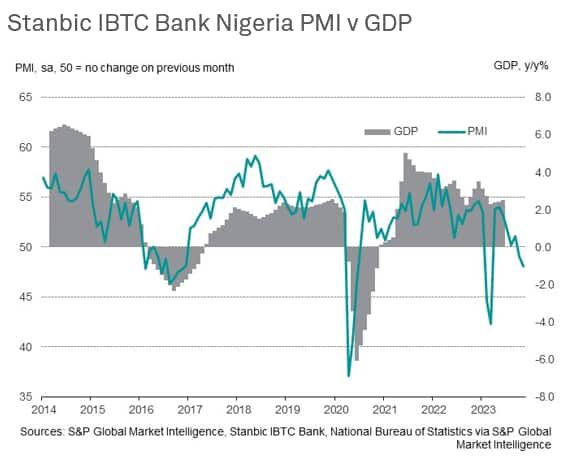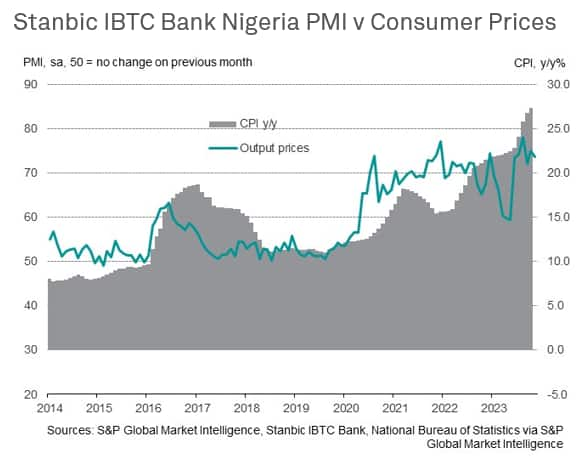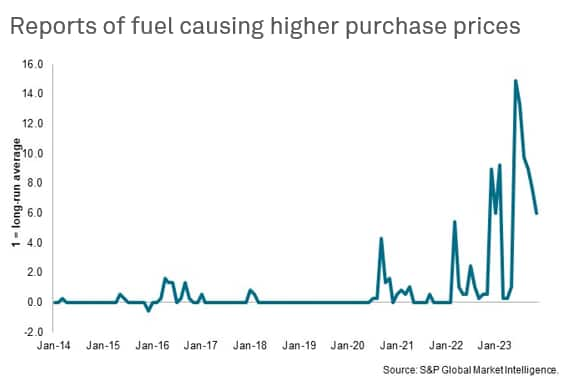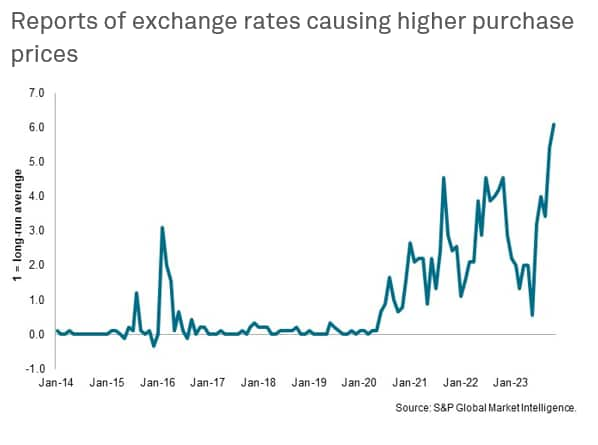Featured Topics
Featured Products
Events
S&P Global Offerings
Featured Topics
Featured Products
Events
S&P Global Offerings
Featured Topics
Featured Products
Events
S&P Global Offerings
Featured Topics
Featured Products
Events
Financial and Market intelligence
Fundamental & Alternative Datasets
Government & Defense
Professional Services
Banking & Capital Markets
Economy & Finance
Energy Transition & Sustainability
Technology & Innovation
Podcasts & Newsletters
Financial and Market intelligence
Fundamental & Alternative Datasets
Government & Defense
Professional Services
Banking & Capital Markets
Economy & Finance
Energy Transition & Sustainability
Technology & Innovation
Podcasts & Newsletters
ECONOMICS COMMENTARY — Dec 06, 2023
The old curse 'may you live in interesting times' may have a certain resonance for companies in Nigeria this year, facing as they have a number of major events which have buffeted their operations. After the cash crisis at the start of the year, firms are now facing rampant inflation blamed on the twin policy changes of removing the fuel subsidy and abolishing the multi-currency regime. The Stanbic IBTC Bank Nigeria PMI, compiled by S&P Global, shows that steep price rises have hit demand and business activity in recent months.
November data pointed to a second successive monthly fall in new business in the private sector, the renewed downturn in the fourth quarter halting a period of recovery following the cash crisis at the start of the year. With demand waning, companies in Nigeria reduced their business activity again in November; the third time in the past four months in which this has been the case. The PMI data are therefore consistent with GDP growth slowing over the second half of the year, following a 2.5% year-on-year increase in the second quarter of 2023.

The drop in demand has come amid steep inflationary pressures. Official data on consumer prices show that the rate of inflation hit 27.3% year-on-year in October, the highest since August 2005. This is consistent with PMI data which have shown selling price inflation running at the steepest pace in the decade-long survey history in recent months, with prices hiked on the back of unprecedented input cost increases.

Thanks to the anecdotal evidence collected from companies when they respond to the PMI survey, we can also gauge the main factors driving prices higher. Respondents to the survey have told us that the removal of fuel subsidies and currency weakness have been the principal factors driving up input costs.
After the removal of the fuel subsidy was announced in late-May, companies began to feel the effects on their costs immediately. By the time of the June PMI survey, the number of firms attributing higher purchase costs to fuel was more than 15 times the long-run average - the highest incidence on record. Reports of higher fuel prices have remained well above average levels into the final quarter of the year, with November seeing reports of six times the average level. That said, this was the lowest since the removal of the fuel subsidy.

Another policy change this year was the abolition of the multicurrency regime in June, which now allows the naira to float more freely. This led to a sharp depreciation in the currency against the US dollar, adding to firms' cost burdens. In the months following this change, reports by PMI respondents of exchange rates causing rises in purchase prices have been running well above the long-run average, culminating in a record number of reports in November when just over six times the normal level of firms signalled that the exchange rate had caused their purchase costs to rise. There is some suggestion, therefore, that currency weakness is starting to become more of a driver of inflation than the removal of the fuel subsidy.

S&P Global Market Intelligence is forecasting consumer price inflation in Nigeria to average 24.3% in 2023, remaining elevated at 18.5% in 2024. These sustained price pressures are likely to mean further difficulties for firms to secure new business, subsequently limiting output growth. The PMI survey will continue to provide the most up-to-date data on price trends and the causes of inflation, while also highlighting the impact on demand.
Access the full press release here.
Andrew Harker, Economics Director, S&P Global Market Intelligence
Tel: +44 134 432 8196
© 2023, S&P Global. All rights reserved. Reproduction in whole or in part without permission is prohibited.
Purchasing Managers' Index™ (PMI®) data are compiled by S&P Global for more than 40 economies worldwide. The monthly data are derived from surveys of senior executives at private sector companies, and are available only via subscription. The PMI dataset features a headline number, which indicates the overall health of an economy, and sub-indices, which provide insights into other key economic drivers such as GDP, inflation, exports, capacity utilization, employment and inventories. The PMI data are used by financial and corporate professionals to better understand where economies and markets are headed, and to uncover opportunities.
This article was published by S&P Global Market Intelligence and not by S&P Global Ratings, which is a separately managed division of S&P Global.
Location
